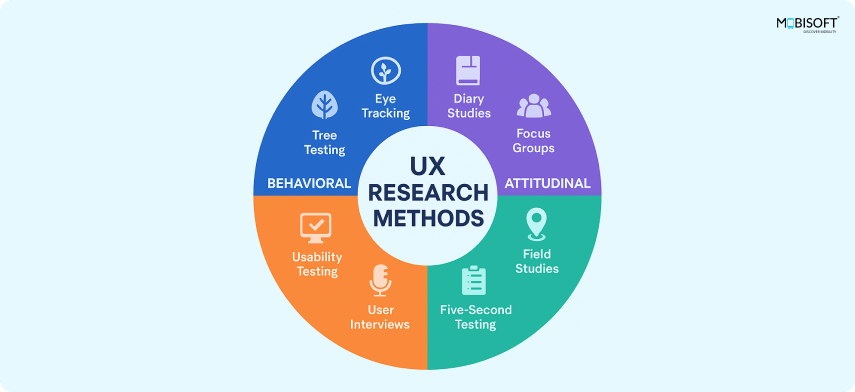-
Fil d’actualités
- EXPLORER
-
Pages
-
Groupes
-
Evènements
-
Reels
-
Blogs
-
Offres
-
Emplois
-
Forums
-
Film
Why UX Research is the Key to Great User Experience Design

Introduction: Let’s Be Honest. You’re Not a Mind Reader
Ever launched something and the response felt flat? Or worse, the feedback lands like a punch, “Did anyone even test this?”
If that stings, you’re in good company.
Here’s the thing. Good UX design rarely comes from gut feelings, late-night whiteboard sessions, or copying what the competition is showcasing. It comes from digging in, talking to people who will use what you build, and letting that guide your choices.
UX research works like a map before a long drive, or a recipe before you start cooking. Skip it, and you are throwing ingredients in a pot and hoping for the best. Users notice that.
So, let’s break down what UX research methods mean, why they often beat UI alone, and how you can use them to create something people want to use.
Explore our End-to-End UI/UX Design Solutions to see how strategic design can improve user experiences.
What Is UX Research? (And No, It’s Not Just Surveys)
User experience research is the process of understanding your users’ behaviors, needs, goals, and frustrations so that you can design something that solves their problems.
Simple, right?
It involves talking to people, observing what they do (not just what they say), and analyzing the data to inform user experience design decisions.
Example
Let’s say you’re designing a to-do app. You assume users want colorful animations to make task-checking “fun.” After a few interviews, you realize they just want one thing: speed. They don’t care about confetti. They just want to add a task, check it off, and move on. That’s user-centered design and UX testing at work.
Learn more about UX Design for Websites and how research informs better digital experiences.

Why UX Research Is the Foundation of Great User Experience Design
It Makes You Design with Purpose
Without research, you’re designing in the dark. You don’t know what users need. You don’t know what frustrates them. You’re guessing, and let’s be honest, you’re not paid to guess.
UX research gives your design research direction. It replaces opinions with evidence.
It Helps You Avoid Embarrassing Mistakes
Ever seen a subscription cancellation form with a “Cancel” button right next to “Submit”? It will confuse users. That’s a mistake you could catch with usability testing.
Example:
In one study, an e-commerce site found that users were dropping off because the “Buy Now” CTA is not clear, and there are a few other actions present with the same importance. A quick test revealed the issue. A new button fixed it. Boom. Conversions up.
It Saves Time (Really)
Many teams think skipping research will speed things up. Spoiler alert: it does the opposite.
Without a UX strategy and research, you waste time building features with undesirable output, only to scrap them later. A few hours of user experience testing techniques upfront can save you weeks of rework. Always remember Time = Cost.
It Boosts User Satisfaction
When you design based on human-centered design and user input, they feel heard. Your product feels like it “just gets them.” That’s how you build loyalty. After all, the product is for your end user’s satisfaction, not for yours.
Discover our approach to Mobile User Experience Design for Apps to create intuitive mobile products.
Types of UX Research (Pick What Fits Your Stage)
There’s no one-size-fits-all method. The approach depends on your product phase, team size, budget, and goals.
Generative Research in UX Design (Discover What to Build)
Used early on to understand user problems.
- User interviews
- Surveys
- Field studies
Example: Interview five freelancers to learn how they manage invoices. Patterns will emerge. Boom insight.
Conducting Effective User Interviews and Surveys for UI/UX Insights

User interviews and surveys can be split into two main types: Quantitative surveys and Qualitative surveys.
Read More: Why UX Research is the Key to Great User Experience Design
- AI
- Vitamins
- Health
- Admin/office jobs
- News
- Art
- Causes
- Crafts
- Dance
- Drinks
- Film
- Fitness
- Food
- Jeux
- Gardening
- Health
- Domicile
- Literature
- Music
- Networking
- Autre
- Party
- Religion
- Shopping
- Sports
- Theater
- Wellness


